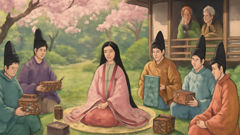Introduction
In the mist-laden valleys near Kyoto, where the forests were thick with ancient bamboo and the air was filled with the songs of hidden streams, there lived a humble bamboo cutter named Okina. Each morning, as the first blush of sunlight spilled through the leaves, he walked the narrow woodland paths with a woven basket on his back, seeking the choicest stalks. His life was simple, marked by gratitude and quiet perseverance, shared with his gentle wife, Ouna. Though their thatched-roof cottage was modest and their meals were plain, contentment filled their days. Yet, in the stillness of night, they often whispered their only wish: to be blessed with a child, someone to carry their love forward when their hair grew silver and their hands grew frail. The world outside their home seemed vast and unknowable, yet their hearts hoped for a miracle. One fateful morning, as Okina’s blade sliced through a luminous stalk, a soft glow burst forth—delicate, otherworldly, as if the morning star had fallen into the palm of his hand. Cradled within the split bamboo, he discovered a girl no larger than his thumb, radiant and serene, her silken hair shimmering like moonlight spun into gold. Trembling with awe and reverence, Okina carried the child home, believing her a blessing from the heavens. Ouna received the tiny girl with tears of joy, wrapping her in silk scraps and whispering prayers of gratitude. They named her Kaguya-hime, meaning 'Shining Princess,' and from that moment, their home overflowed with laughter and wonder. As seasons passed, Kaguya-hime grew with uncanny grace and speed, blossoming into a young woman of ethereal beauty and quiet wisdom. Rumors of her radiance drifted through the mountain villages and into the corridors of Kyoto’s imperial court, drawing suitors and seekers from distant provinces. Yet, beneath her gentle smile, Kaguya-hime held secrets as deep as the night sky—secrets that would shape not only her destiny but the fate of all who loved her.
The Radiant Child of Bamboo
From the moment Kaguya-hime entered Okina and Ouna’s home, the world around them changed in subtle, wondrous ways. Their once faded tatami seemed to glow with renewed warmth, the old plum tree outside flowered twice each year, and even the sparrows lingered longer on their porch, as if hoping to glimpse the miraculous child. The villagers, respectful but curious, whispered legends about heavenly maidens and the gods’ favor. Okina, deeply moved by the blessing, continued his work in the bamboo groves. Yet he soon discovered that every stalk he cut after finding Kaguya-hime concealed treasures within—golden coins, silken cloth, and shimmering jewels, more than enough to transform their lives. Grateful but cautious, the family gave generously to neighbors in need, earning the trust and affection of their community.

Kaguya-hime herself grew at a pace that defied nature. In just three months, she transformed from a thumb-sized infant into a graceful young maiden. Her skin shimmered with an almost translucent glow, her eyes reflecting the calmness of distant lakes beneath starlight. She moved with unstudied grace, her voice soft as falling petals, and wisdom beyond her years shone in her quiet gaze. Ouna taught her to weave, to tend the garden, and to compose haiku, while Okina delighted in her laughter as they strolled beneath the whispering bamboos. But sometimes, when the moon was full, Kaguya-hime would sit alone, gazing up at the silver disk with longing and sadness that no one could fathom.
The news of her beauty and gentle spirit soon traveled beyond their village. Poets composed verses in her honor, and painters tried to capture her likeness, though none could do justice to her ethereal presence. It wasn’t long before suitors began to arrive—first from nearby provinces, then from distant lands. They came bearing gifts of jade combs, rare fans, and brocaded silks. Some recited poetry; others boasted of their wealth and lineage. But Kaguya-hime, with the kindness that defined her, received each guest with grace yet gently declined every proposal. She explained that her heart did not stir for riches or rank, and no gift could sway her soul. Her refusals were gentle but resolute, puzzling those who expected her to crave the comforts of power and luxury.
Ouna and Okina worried for their daughter, fearing that her otherworldly beauty might bring trouble from envious hearts. Yet Kaguya-hime assured them with a tender smile: 'Please do not worry for me. My place is with you, at least for now.' Still, each rejection only fueled the determination of suitors. Five of the land’s most illustrious noblemen—Minamoto no Asakura, Tachibana no Tomotari, Abe no Ishizuki, Kuramochi no Mikado, and Otomo no Muramaro—swore they would win her hand, setting out on perilous quests to bring her impossible treasures: the Buddha’s stone begging bowl, a jeweled branch from Mount Hourai, a robe made from fire-rat’s fur, a colored jewel from the dragon’s neck, and a cowrie shell born of swallows.
Seasons shifted as the suitors’ quests stretched on. Each returned with what they claimed to be the genuine artifact, but Kaguya-hime saw through every deception or forgery. Some returned empty-handed, humbled by the futility of grasping what was never meant for them. One nobleman nearly perished at sea; another was struck by illness in distant lands. Kaguya-hime’s heart ached at their suffering, but she could not betray the truth she carried within. As the suitors fell away, the tale of her wisdom and unattainable grace spread all the way to the imperial court.
Imperial Shadows and Celestial Longing
As summer turned to autumn, the Emperor himself, Mikado, heard tales of the shining maiden hidden deep within the bamboo forests. Driven by curiosity and a growing fascination with her legend, he sent emissaries with gifts and messages of goodwill. When these envoys returned, humbled by Kaguya-hime’s gentle refusals, Mikado resolved to see her with his own eyes. On a night bright with a harvest moon, he traveled incognito to the bamboo cutter’s humble home. There, amid the flickering lanterns and the hush of night insects, he found Kaguya-hime seated by a window, lost in silent reverie. Her beauty stunned him—not merely for its delicacy, but for the sense of sorrow that hung around her like a veil.

They spoke at length, exchanging poems about the moon, longing, and the nature of impermanence. The Emperor was captivated by her wit and her spirit as much as her looks. Though he declared his love and offered her a place in his palace, Kaguya-hime gently declined. 'My heart is full of gratitude,' she told him. 'But my destiny is not bound to this world.' The Emperor pleaded, offering to make her Empress and to protect her family from any harm. Kaguya-hime’s eyes shimmered with tears. She confessed a truth she had hidden even from herself: with every passing month, she felt herself drawn inexorably toward the moon, as if a silver thread tugged at her soul. She feared she would not remain on earth much longer.
Mikado, moved by her sadness, promised to respect her wishes but could not abandon hope. He visited often, sometimes alone, sometimes accompanied by trusted courtiers who were sworn to secrecy. Each time, he left with more questions than answers. Villagers began to notice strange happenings: flocks of white herons circling above the bamboo at night, a cool luminescence that bathed Kaguya-hime’s window, dreams of moonlit gardens that haunted those who had met her. Ouna grew worried. Okina prayed to the household gods, asking them to let his daughter remain.
With the approach of midsummer, Kaguya-hime’s mood darkened. She withdrew into herself, her gaze fixed more often on the moon. On the fifteenth night of the eighth month, as the great harvest moon reached its zenith, Kaguya-hime confessed everything to her grieving parents. She was not of this earth but of the Moon Kingdom—a celestial realm where sorrow was unknown and time flowed differently. For reasons she herself could not remember, she had been sent to live among mortals. Now, her kin would come to reclaim her, and nothing could prevent it.
Ouna wept openly. Okina, his heart breaking, begged her to plead with the moon people for mercy. The Emperor, upon learning this, dispatched soldiers to guard the cottage, determined to prevent Kaguya-hime’s departure. Yet she warned them gently: 'No earthly power can bar the way of those who come from the sky.' On the appointed night, as the moon rose full and radiant, a mist rolled down from the peaks. The garden glowed with unearthly light, and celestial envoys—clad in robes of white and gold—descended on clouds of pearl. Music like the chiming of stars filled the air. Kaguya-hime, trembling with sorrow and love for her earthly parents, embraced them one final time. She left behind a letter and an elixir of immortality for the Emperor—a token of her gratitude and regret.
As she donned the feathered robe of her people, her earthly memories faded. The moon’s envoys led her away, rising into the night sky as Ouna and Okina wept beneath the vanishing glow. The Emperor, upon receiving her letter and the elixir, ordered that the potion be burned atop Mount Fuji—its smoke rising toward the heavens, a final message of longing.
Conclusion
In the quiet that followed Kaguya-hime’s departure, the world seemed both emptier and more wondrous. Okina and Ouna mourned, yet cherished the kindness and beauty she had brought into their lives. The Emperor, ever haunted by moonlit memories, would gaze at the night sky, searching for a trace of her gentle spirit. On clear evenings, villagers claimed to see a soft glow on Mount Fuji’s summit—the last ember of love sent skyward by those who loved her. Over generations, the tale of the bamboo cutter and his celestial daughter spread far and wide, woven into song, poetry, and festival. It became not only a story of longing and love lost but also a reflection on the fleeting beauty of life and the power of gentle wisdom to touch even emperors and gods. The forests where Kaguya-hime once laughed are lush as ever, and sometimes, when moonlight falls just right through the bamboo leaves, it’s said her laughter can be heard—an echo of kindness left behind for all who wander beneath ancient trees.


















